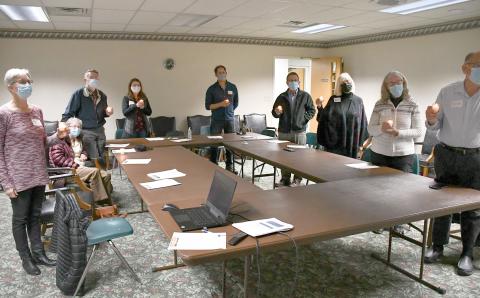As I Was Saying is a forum for a variety of perspectives to foster faith-related conversations among our readers with the goal of mutual learning, even in disagreement. Apart from articles written by editorial staff, these perspectives do not necessarily reflect the views of The Banner.
We live in polarized times.
From extreme differences in politics to opposing views on the pandemic—such as the use of masks, vaccinations, and lockdowns—to varying opinions on the denomination’s official stance on LGBTQ+ rights and policies, to numerous other topics, polarization seems to have pervaded every corner of our families, churches, and society.
I see waves of this throughout social and traditional media. One Facebook group I joined favors very uniform beliefs about numerous political, societal, and religious topics: anyone who even slightly disagrees with the consensus is vehemently bashed, terribly ridiculed, and often immediately banned from the group.
I experience differences on a frequent basis with a loved one who shares completely opposite views to me on anything and everything to do with COVID, including our province’s strict COVID restrictions and the implementation of what is in all but name a vaccine passport. This passport, which is obtained when a person receives the full number of vaccinations, allows access to places such as restaurants, gyms, theaters, and museums.
We live in Canada’s northernmost large city, where for seven or eight months per year the average temperature is below freezing with snow on the ground; in a climate such as ours, having access to indoor places is a lifeline for most in the winter. I’ve witnessed this person I love live with very high restrictions for their choice to not vaccinate. I’ve spent much time trying to convince them to see things my way. It hasn’t worked, nor have they swayed me: frustration, mistrust, and hurt has resulted on both sides.
And yet, by continuously choosing to love each other even in the face of this hurt and despite our differences in perspective, God has been teaching us invaluable lessons about love, faithfulness, and commitment. Ever so slowly, we are discovering that despite highly diverse beliefs, we can make respect, love, and acceptance foundational in our relationship.
One of the most powerful examples I’ve encountered of love and respect in differences has occurred within a group of friends from my church over the past few months. It all began with email discussions we’ve been having in advance of the denomination’s Human Sexuality Report, which will be addressed by Synod 2022.
We were floored to discover how deeply split we are on how the church should respond to, enact policies, and treat people who identify as LGBTQ+.
Each friend feels passionately about her views, which she assumed were shared by the others. It has evoked deep emotion to discover others hold opinions with which we highly disagree.
Every woman can support her perspective with Scripture and the teachings of contemporary Christian leaders, and we have not minced words or been shy in sharing our thoughts. This aligns with the example of Jesus, who certainly did not hold back and was not afraid to call out even the rulers and powerful people of the day about things that were important. To be a Christian does not necessarily mean to be quiet, passive, and withdrawn.
However, it does mean that we are to place love of God and our neighbor at the forefront of all we do, following the example of Christ, who literally gave up his entire life for others.
Through these intense discussions as friends, we have prioritized treating each woman with respect, love, and dignity. Knowing this is a potentially contentious issue where emotions can run high, from the beginning we have worked hard to set and follow ground rules about these priorities, to assume attitudes of listening and learning, and to create a safe environment where differences of thought are OK and each woman is valued.
Key elements include never responding in anger but taking time to check our assumptions; hearing each other’s words and the heart at the basis of those words; reflecting on what was shared before responding; and understanding that each woman has something valuable to say. As described by one of the women, we “take time to let what others say be absorbed and studied before responding. We are trying to see what is common rather than not common.”
This friend recently referred me to the Colossian Forum, which “equips Christians to experience the transforming power of conflict. An innovative method based upon traditional Christian practices, The Colossian Way helps Christians practice loving God and each other while engaging difficult disagreements.”
How different our world would be if listening, respect, love, dignity, and mutual learning were the norm in how we treat each other including in how we disagree. If we could love one another as Christ loved us, approaching each other with humility, how much stronger, safer, and Christ-honoring our society, families, and churches could grow to become.
Editor’s Note: The Banner has begun a new series in partnership with the Colossian Forum on the topic, “Seeking Shalom in Our Polarized World.” Read new articles here every other week.
About the Author
Jenna C. Hoff is a freelance writer and editor in Edmonton, Alta. She is a member of Fellowship Church of Edmonton.









